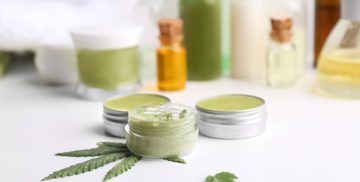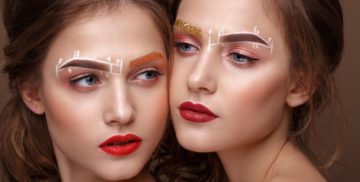Acne is the bane of many a teenager's life, but even those of us for whom the teenage years are only a fond memory aren’t immune to the odd breakout. To save your skin, why not consider using CBD for acne?
Skin problems make us turn to tonics and chemical cocktails. These synthetic solutions more often than not either don't work or, worse, irritate the skin even further. But is CBD the answer? This article is a complete guide on CBD oil for acne and how it may help ease the symptoms.

Causes of Acne
The skin lubricates and protects itself from drying out by secreting an oily substance called sebum. They are secreted from sebaceous glands located underneath the skin. The lubricant then travels up hair follicles and appears on the outer skin via the pores.
Hair follicles routinely shed dead skin which sebum carries out of the body. When too many skin cells are shed and excess sebum is released, the pores can become clogged. This results in a build-up of excess bacteria that flourish in the pores resulting in inflammation and spots.
- Pores clogged by dead skin
- Excess sebum production
- Bacterial infection
- Oversecretion of hormones
Pores Clogged by Dead Skin
When too many dead skin cells are released at once it can cause a build-up. The cells and the excess sebum stick together and clog the pores.
Excess Sebum Produced
Excess sebum produced by the sebaceous glands can result in blocked pores, greasy scalp and oily skin leading to spots forming.
Bacterial infection
Bacteria exist in small amounts on the skin. However, when a blockage occurs the number of bacteria grow, flourishing in the sebum leading to inflammation.
Oversecretion of Hormones
The hormone androgen increases during puberty causing the sebaceous glands to enlarge resulting in increased levels of sebum.
Scientific Research and Evidence
The efficacy of CBD in treating acne is supported by a growing body of scientific research, encompassing preclinical studies, clinical trials, and observational analyses. These studies offer valuable insights into CBD's mechanisms of action and its potential as a therapeutic agent for acne management.
Delving deeper into the molecular mechanisms, CBD exhibits multifaceted actions that contribute to its effectiveness in combating acne. Research indicates that CBD interacts intricately with the body's endocannabinoid system (ECS), a complex network of receptors and neurotransmitters involved in various physiological processes, including skin health.
Mechanisms of Action:
Research indicates that CBD interacts with the endocannabinoid system (ECS), a complex network of receptors and neurotransmitters that regulate various physiological processes, including skin health. CBD modulates ECS activity by binding to cannabinoid receptors, particularly CB2 receptors found abundantly in the skin. This interaction regulates sebum production, reduces inflammation, and promotes skin homeostasis, key mechanisms implicated in acne pathogenesis.
Clinical Trials and Observational Studies:
Clinical trials evaluating the efficacy of CBD in acne treatment have yielded promising results. In a randomized, double-blind study published in the Journal of Clinical Investigation, researchers found that CBD significantly reduced sebum production and exerted anti-inflammatory effects in acne-prone skin. Similarly, observational studies have documented improvements in acne severity and lesion count following CBD treatment, corroborating its therapeutic potential.
Peer-Reviewed Publications:
Peer-reviewed publications serve as a cornerstone of evidence-based medicine, providing rigorous scrutiny and validation of research findings. Numerous studies investigating CBD's effects on acne have been published in reputable scientific journals, adding to the growing body of evidence supporting its efficacy. These publications contribute to our understanding of CBD's therapeutic mechanisms and inform clinical practice guidelines for acne management.
Future Directions in Research:
As interest in CBD for acne continues to surge, researchers are exploring novel avenues for therapeutic innovation. Future studies may delve deeper into CBD's interactions with specific cellular pathways implicated in acne pathogenesis, uncovering new targets for intervention. Additionally, investigations into synergistic effects of CBD with other skincare ingredients or therapies hold promise for enhancing treatment outcomes and addressing acne's multifactorial nature.
What Is Cannabidiol (CBD)?
Cannabidiol or CBD as it is more commonly known as is a cannabinoid (compound) from the cannabis plant best known for its anti-anxiety, anti-inflammatory, and antiseizure effects.
Unlike its cousin THC, cannabidiol does not invoke a psychotropic effect and as such, those who dislike the euphoric ‘high’ feeling typically associated with cannabis will be glad to know it does not exist with CBD oil, regardless of the quantity taken.
Rather, this wonderous compound has been shown to have a plethora of potential medicinal benefits, all because it interacts with a very influential, yet quite an unknown system only discovered 30 years ago.
Why Do People Use CBD Products?
CBD has been causing rage in the medical industry since the time the WHO deemed it safe to use. Moreover, with influencers and anecdotal evidence surrounding the mystery compound promulgating its benefits, the fire hasn't stopped.
CBD is touted to benefit people suffering from depression, cardiovascular issues, erectile dysfunction etc.
CBD rose to prominence owing to the calming effect it produces. Particularly, the absence of the high causing THC made the compound more attractive. It has worked wonders for people suffering from anxiety.
As a pain reliever, CBD ointments are also used to treat chronic pain and injuries.
CBD's anti-inflammatory properties are another great benefit owing to which it finds its use in skincare. There are compounds to treat pain and stiffness occurring due to inflammation. However, people see CBD as a natural alternative.
Apart from this, Medical News Today notes that CBD can also help to treat:
- sleep disorder
- migraine
- post-traumatic stress disorder (PTSD)
- epilepsy and other seizure disorders
- lung conditions
- Alzheimer’s disease
The Endocannabinoid System
The endocannabinoid system (ECS) and CBD is a complex molecular signaling system present in all mammals, responsible for a host of functions including mood, memory, appetite, pain, and more. All of which contribute to homeostasis (balance of health).
The body creates neurotransmitters known as endocannabinoids which send messages to receptors located throughout the body in order to perform an action.
An example of this is after exercise when the endocannabinoid ‘anandamide’ is released, it then interacts with CB1 receptors in the brain resulting in the familiar ‘runners high’. Shortly after, enzymes break down this molecule relinquishing this bliss.
Incredibly, phytocannabinoids from the cannabis plant mimic the activity of endocannabinoids precisely, like a substitute coming off the bench to replace a player.
Cannabinoids such as cannabidiol (CBD) have been linked with a host of medicinal benefits and it may be the solution for millions of people in the UK who suffer from skin problems such as acne.
What is Bioavailability and Why Does it Matter?
Before using any of the above means, let us quiz you. How much CBD do you think went when you last consumed any CBD product?
You can figure that out by knowing bioavailability.
Bioavailability is the rate and extent to which a compound is absorbed into the blood. For instance, if the bioavailability of a CBD topical is somewhere around 45%, then about 45% of CBD is absorbed into your bloodstream. The bioavailability of CBD can range anywhere between 10%-100% depending on the mode of consumption.
Understanding this phenomenon can help you decide how you want to soothe your way to acne-free skin.
Best CBD Serum for acne
We looked at 10 different skincare brands and one stood out way ahead of the rest based on results. It also was great value for money and has many active ingredients outside of CBD to help your skin.
Poko CBD is a UK brand launched in early 2020 and we would love to see more of it in shops both in the UK and the US. For now, the best way to buy Poko is online at their store https://www.pokobeauty.com/
Best Ways to Use CBD for Acne
There are numerous ways to get CBD oil into your body. All methods will result in this compound interacting with receptors in your body to give you the end result. However, when it comes to acne, in particular, topicals are the preferred choice and for good reason.
Topicals
There is a huge range of creams, balms, and salves available containing different strengths of CBD. CBD oil is highly permeable and can enter the skin easily where it accumulates in the sebaceous gland. Topicals containing hemp seed oil should be the number one choice for people looking to treat acne as hemp seed oil also contains essential amino acids.
Capsules
Capsules are a precise method of ingesting cannabidiol easily and effectively. Varying strengths accommodate every unique ECS system and the effects will last up to 8 hours. They are also available in a vegetarian form.
Vaping
Vaping flower or e-liquid provides fast onset of effects because the vapour enters the lungs where it quickly enters systemic circulation via pulmonary absorption. Because vaporizers heat the product rather than burn it, you can be assured that there will be no toxic substances that may arise from combustion methods.
Tinctures
Drops are placed under the tongue using a pipette for accurate, effective dosing. Numerous strengths are available so you can take less but get more. Bottles come in a variety of natural or terpene infused flavors for every palate.
Edibles
For those who may not like the taste of the oil, you can purchase a wide variety of foods, drinks, and snacks. Edibles give you precise dosing that can last for up to 8 hours. You can even bake your own delicious treats with a host of recipes available. Take a look at our related article on CBD edibles to learn more.
Smoking CBD
Burning flower in a roll-up or other smoking paraphernalia results in a quick onset of effects, but combustion can result in other toxins being produced and so vaping flower in a quality electronic device is considered a much safer alternative.
How to use CBD for Acne?
Well, it depends.
To use CBD oil to treat acne, you could simply mix it with some carrier oil and apply it topically. Be cognisant in understanding what works for your skin. Carrier oils include coconut oil, olive oil, shea butter and argan oil.
When using CBD oil for acne, you could start as low as 5-20mg and then up a notch by 3-5mg every few days. CBD oil takes some time to work.
Obviously, you'd feel the therapeutic effects of CBD with 30 minutes. However, getting rid of acne takes time. After a few weeks, your body begins to absorb the oil and let it penetrate the tissue layers and regulates your inflammatory system.
You could also take CBD oil orally, to treat your acne. CBD's anti-inflammatory wing still fights for your relief.
However, most studies centre around using CBD topically. So to best emulate the results of the study you could use topical products.
How Does CBD Oil Treat Acne?
Cannabidiol action on the ECS of the skin is as multifaceted as the plant it comes from. Researchers at the University of Debrecen, Hungary, published a remarkable study showing CBD oil having a “trinity of cellular anti-acne actions” such as:
- Increased sebum production is a result of endogenous cannabinoids (anandamide and 2AG) produced in the sebaceous glands acting on CB2 receptors. CBD oil was shown to inhibit the lipogenic action of these endocannabinoids in a dose-dependent manner regulating sebum production.
- CBD was also shown to possess remarkable antibacterial effects by eliminating the bacteria that surround the site of infection.
- It's anti-inflammatory effects prevented “pro-acne” agents from elevating pro-inflammatory cytokine levels.
In fact, the researchers showed that CBD oil even changes our DNA. This incredible compound was shown to upregulate the expression of 72 genes among which multiple potential “anti-acne” genes were identified.
Does Cannabidiol Help With Acne Scars?
CBD oil can help with acne scars according to researchers from Modena in Italy. Studying the application of CBD ointment on 20 participants, the researchers found CBD infused with hemp oil, “significantly improving skin parameters”. To be explicit, the participants saw improvements in skin hydration and elasticity.
In this study, the topical was administered to lesioned skin twice daily for 3 months.
The researchers noted that the antiproliferative (cell changing) and anti-inflammatory effects of CBD oil instigated these positive changes. Clinical analysis, photographic data, and subjective patient responses further support this correlation.
Does CBD Oil Work on Body Acne?
Yes CBD oil can work on body acne also. The back, chest, shoulders, and neck can break out in acne because they contain more sebaceous glands than the rest of the body.
This safe compound can reduce sebum excretion which creates the bottleneck effect that results in the pronouncement of a spot. It also lowers the number of bacteria that gather at the site of infection and reduces the accompanying inflammation.
Will CBD Oil Help With Any Other Skin Problems?
Skin, the largest organ in the body, contains within it the ECS molecular signaling system that CBD oil has been proven to interact with directly and/or indirectly. It has the ability to alter signals in the body and the brain resulting in anti-bacterial, antioxidant, anti-inflammatory, anti-microbial effects which contribute to a balance of health and have been shown to:
Reduce Psoriasis
Psoriasis is a disease emanating from the immune system. It causes red, scaly patches to appear on the skin. It usually appears on elbows, knees scalp but can appear anywhere on the body.
Psoriasis cannot be directly cured by CBD. However, there are a few triggers that can be suppressed using CBD. CBD's anti-inflammatory properties help balance the immune system, which influences these conditions.
Find relief from Eczema
Eczema occurs when the immune triggers an overreaction to inflammation. Currently, there is no cure to eczema although there are several medicines to treat the condition. However, they have their own side effects.
There is a good body of research to support CBD's role in suppressing pangs of pain from Eczema. CBD's antioxidant properties can help minimize the effects of eczema flare-ups. Moreover, with less to zero adverse side effects, CBD stands up tall as an alternative.
Relieve anxiety
There are many studies that have found a correlation between stress and skin. CBD can help you relieve yourself from anxiety and treat your skin.
Sensitive skin
The anti-inflammatory properties can also help soothe skin irritation. However, we recommend you not to add ingredients to CBD topicals as they may irritate your skin as well.
Itchy skin
Since 2005, studies have pointed out the topical application of CBD to treat itchy skin. A study, based on hemodialysis patients with itchy skin found that 81% of people who used CBD creams were completely relieved of their symptoms.
The authors explained that CBD had the potential to block off nerve endings that receive a signal from the brain to cause skin itching.
Are there any side-effects?
Obviously, any medication would have side effects. So it is completely right to fear if CBD has any side effects associated with it.
Generally, CBD has a great safety profile. However, it isn't completely free of allegations of side-effects.
A few side effects that researchers have noticed is appetite changes, diarrhea and fatigue. However, you should also note that these effects were observed only after overdosing on CBD. Well, there's no excuse for that, is there?
Generally, there are no reported side effects when CBD is topically used. However, each one of us has different skin sensitivities. So, it's best to first understand what you are allergic to and dose on CBD.
The main takeaway is that when CBD is applied directly on the skin it is relatively safe. Just be cautious when you mix it with other ingredients or if you have any allergic conditions.
Conclusion
Although research is up and coming, cannabidiol has shown tremendous potential in treating a number of skin conditions, including acne. CBD mainly goes after fighting excess sebum production, bacteria, and inflammation.
No other anti-acne agent can compare to cannabidiol in terms of effectiveness and its impeccable safety profile. Not only that but this cannabinoid is well-tolerated in humans and has been shown to not irritate the skin either.
In fact, rather than fighting CBD's growing reputation, major skincare brands such as Kiehl’s, Ho Karen and Lord Jones have actually infused it into their products.
Acne and other skin blemishes should not put a halt to our lives. However, when they start to affect your mental health why not try a more natural solution backed by science.











